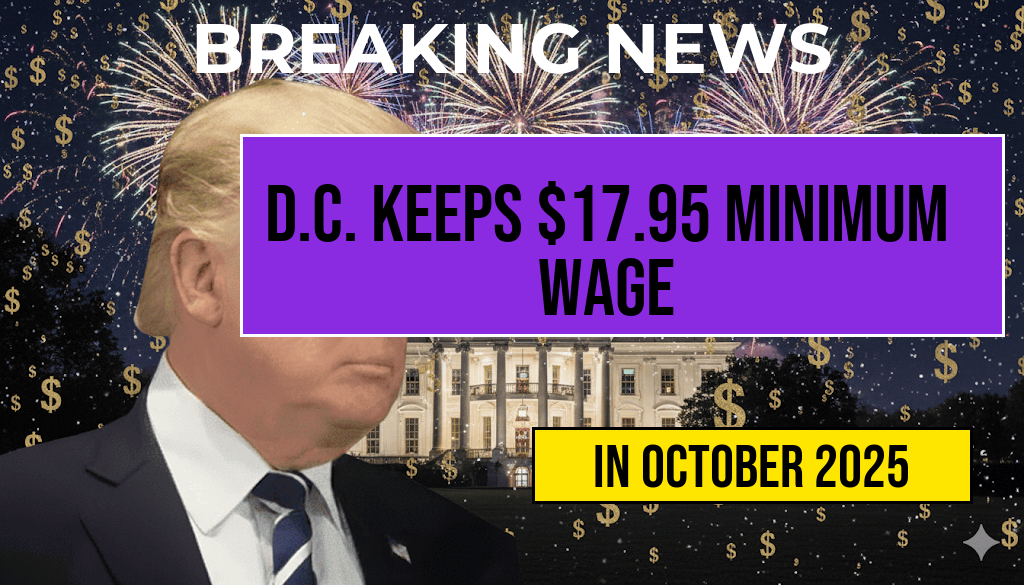Washington D.C. continues to lead the nation in minimum wage standards, with a rate of $17.95 per hour as of July 2023. This increase, part of a gradual rise initiated in recent years, positions the capital significantly ahead of many states and municipalities across the United States. The latest adjustment reflects ongoing efforts to ensure that workers can meet the high cost of living in the area, where housing and essential expenses have surged. Advocates for labor rights celebrate this milestone, arguing that a higher minimum wage promotes economic growth and reduces poverty levels. However, critics raise concerns about potential downsides, including the impact on small businesses and employment rates.
Context and Background
The minimum wage in Washington D.C. has seen a steady increase over the past several years. In 2016, the rate was set at $11.50, and it has gradually climbed as part of a broader initiative to address income inequality. The current wage of $17.95 is a result of legislation passed in 2018, which instituted yearly increases until it reached $15 in July 2020. Subsequently, the wage has been adjusted annually based on the Consumer Price Index, ensuring that it keeps pace with inflation.
Impact on Workers
The substantial minimum wage in D.C. has significant implications for workers in various sectors, particularly in hospitality, retail, and service industries. Supporters argue that the increased wage allows individuals to afford basic necessities, thereby improving their quality of life. Recent reports indicate that approximately 100,000 workers in the district benefit from this wage increase, contributing to a stronger local economy.
- Higher wage supports families and reduces reliance on government assistance.
- Increased disposable income leads to higher consumer spending.
- Potential for reduced employee turnover in high-stress jobs.
Responses from Businesses
While many workers welcome the increased pay, business owners express mixed feelings about the implications of such a high minimum wage. Some small business owners argue that the increased labor costs could lead to higher prices for consumers or reduced hiring. A recent survey of local businesses indicated that:
| Response | Percentage |
|---|---|
| Support for minimum wage increase | 35% |
| Concern about increased operational costs | 45% |
| No impact expected on hiring | 20% |
Many business owners advocate for a more gradual approach to wage increases, suggesting that sudden jumps could destabilize the market. The D.C. Chamber of Commerce has expressed concerns that continued wage hikes could lead to job losses, particularly among entry-level positions that serve as crucial stepping stones for many workers.
Comparative Analysis with Other Regions
Washington D.C.’s minimum wage stands out when compared to other major cities in the United States. As of 2023, cities such as San Francisco and Seattle also feature high minimum wages, but D.C. remains slightly ahead. For instance, San Francisco’s minimum wage is set at $16.99 per hour, while Seattle’s is $15.75. This positions D.C. as a leader in worker compensation, showcasing its commitment to addressing economic disparities.
Future Outlook
The trajectory of minimum wage increases in Washington D.C. remains a topic of keen interest among policymakers and labor advocates. As the cost of living continues to rise, the D.C. Council may consider further adjustments in the coming years. Current discussions also involve the potential for indexing the minimum wage to the regional cost of living, ensuring that future increases reflect economic realities.
As cities across the nation grapple with the balance between supporting workers and fostering business growth, Washington D.C.’s approach may serve as a model or a cautionary tale. The outcome of this high minimum wage experiment will undoubtedly influence future legislation elsewhere, prompting a national conversation about fair pay and economic sustainability.
For more information on minimum wage laws and their implications, visit Wikipedia or explore reports from Forbes.
Frequently Asked Questions
What is the current minimum wage in Washington D.C.?
The current minimum wage in Washington D.C. is $17.95 per hour, making it one of the highest in the nation.
How does Washington D.C.’s minimum wage compare to other U.S. cities?
Washington D.C. maintains its dominance with a minimum wage of $17.95 per hour, significantly higher than many other U.S. cities, which often have minimum wages below $15 per hour.
Are there any plans to increase the minimum wage in Washington D.C.?
As of now, there are no specific plans announced for further increases to the minimum wage in Washington D.C., but it is subject to review based on economic conditions.
Who is affected by the minimum wage in Washington D.C.?
The minimum wage in Washington D.C. affects a wide range of workers, including those in the service industry, retail, and other sectors who earn hourly wages.
What are the implications of a high minimum wage like $17.95?
A high minimum wage of $17.95 can lead to increased earnings for low-income workers, but it may also prompt discussions on potential impacts on employment rates and small businesses.

Leave a Reply